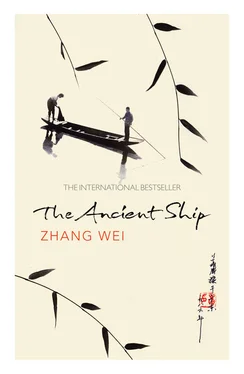The drying floor was the scene of intense activity even before sunrise. Older women gauged the direction of the day’s wind by looking up at the cloud formations and then positioning the racks accordingly; they needed to be set perpendicular to the wind to keep the wet strands from sticking together when gusts blew. Horse carts rumbled up to deliver basketfuls of wet glass noodles; the snowy white, unblemished strands were hung over racks, where the young women spread them out and shifted them with their dainty fingers all day long, until they were dry and so light they fluttered gracefully like willow catkins with each breeze.
People said that White Dragon glass noodles had earned their reputation not only because of the extraordinary quality of Luqing River water, but also because of the young maidens’ fingers. They touched the strands with great care, from top to bottom and from left to right, like strumming a harp. The colors of the sunset played on their faces as light retreated from the noodles until, finally, they could tolerate no colors at all; they had to be the purest white.
As the women’s bodies warmed under the sun, one of them began to sing softly. The notes went higher, and everyone within earshot stopped to listen. When finally she realized she had a rapt audience, she stopped and was rewarded with applause and laughter. The loud est voice on the drying floor belonged to Naonao, who was used to doing whatever she wanted, even cursing at someone for no apparent reason. No one on the receiving end ever minded, knowing that was just how she was. She’d learned disco from TV, and sometimes she danced on the drying floor. And when she did, the others stopped working to shout, “More, more, more…” But Naonao never did what others wanted, so instead of dancing, she’d lie down on the hot sand and expose her fair skin to the sun. Once, as she lay on the sand, she began to writhe and said, “Day in and day out there’s something missing.” The others laughed. “What’s missing is a goofy young man to wrap his arms around you!” an elderly woman said. Naonao jumped up from the sand. “Hah!” she exclaimed. “I’m afraid that particular goofy young man hasn’t been born.” The others applauded gleefully. What a happy scene it was, with laughter all around as they turned and headed back to the noodles.
Hanzhang generally kept her distance from the center of activity and on some days would hardly talk to anyone. She was tall and thin, and had large, dark eyes and long lashes that fluttered constantly. It was common for Naonao to slip under drying racks to run over to Hanzhang, filled with chatter. Hanzhang would just listen.
Then one day Naonao asked, “Who’s prettier, you or me?” Hanzhang smiled. Naonao clapped her hands. “You have a wonderful smile. You always look so down in the dumps, but when you smile you’re really pretty.” Hanzhang didn’t say a word as her hands kept flying over the racks. Naonao babbled on, even took Hanzhang’s hand and held it up to get a closer look. “What a lovely hand, with such pretty little nails. You really should paint them red. Oh, have you heard? From now on, when you paint your nails, you won’t have to use oleander. Now they have oil you paint on, and your nails are red.” She lifted Hanzhang’s hand, and when she lowered her head she could see Hanzhang’s pale upper arm up the sleeve, which so unnerved her she dropped the hand. The skin was so nearly transparently thin Naonao could actually see the veins beneath the surface. She then looked at Hanzhang’s face, which was slightly sunburned. But the skin on her neck and spots covered by her bandanna were the same color as her arm. Naonao held her tongue as she studied Hanzhang, who was carefully separating two strands of glass noodles that were stuck together. “You Suis are strange people,” she said as she quietly went to work beside Hanzhang, who sensed that there were more knots in the noodles than usual, too many for her to handle. After separating several that were stuck together she looked up and sighed and noticed that Naonao was gazing off in the distance. She turned to see what Naonao was looking at. It was the mills across the river.
“Isn’t he afraid at night, sitting there all alone?” Naonao asked.
“What do you mean?”
Naonao looked at her. “Your brother! They say the old mill is haunted…”
Hanzhang looked away and straightened some strands. “He’s not afraid. Nothing scares him.”
The sun was high in the sky, its rays reflected off the noodles, the riverbank, and the water. Children with baskets waited in the shade of willows, their eyes fixed on the shiny strands of noodles. Every day they waited for the dry strands to be taken off the racks so they could run over and throw themselves down on the hot sand, but lately the drying women had been getting miserly. After taking away the noodles, they even raked the sand under the racks, which meant hardly any pieces were left. But that did not stop the children from waiting, nor did it quell their excitement.
The moment the women raised their rakes, the children let out a whoop and charged, falling to their knees and scrounging for broken pieces. Some put their baskets aside and frantically scooped up sand with their hands and then sat there picking through the pile. The workers inevitably dropped strands onto the sand and stepped on them, and anyone who found a half-foot length would jump up in delight. As the sun crept across the sky, the children under the willows put their baskets over their heads, took them off, and put them back again, displaying their impatience. The oldest among them was only eight or nine, and since they had nothing to do, their parents sent them out to gather some noodles, which could be sold on market days. While they waited they asked each other how much they’d earned in the past.
But today the widow Xiaokui brought little Leilei over to sit beneath a willow tree. Leilei was a boy who refused to grow, and it didn’t seem to people that he was any taller now than he used to be. The other children laughed, and one of them mocked him in a loud voice, “Of course we’re not going to be able to pick as much as him…”
Xiaokui just stared at the drying floor without saying a word, her hand resting heavily on Leilei’s head. He looked on blankly, his lips turning dark as he snuggled up close to his mother. She was watching Hanzhang work the racks and saw her remove a long strand, then pick up her rake, which she raised above her head. “Go on, run!” Xiaokui said to her son, who ran out onto the drying floor, but not as fast as the other kids, who had sharper eyes and stronger legs. They elbowed their way up to Hanzhang and sprawled on the sand. Xiaokui tried to spot her son, but there were too many kids, too many grimy hands blocking her view. She stood up, straightened her hair, and walked out among the children.
Hanzhang gave the ground a quick rake and drew a line in the sand in front of each area she raked; no one was permitted to cross that line to scavenge for broken noodles. She kept her eyes on all those black hands sifting frantically through the sand and moving immediately to each new open spot. But when she looked up she saw Xiaokui, digging through the sand beside Leilei, and for some unknown reason, the hand holding the rake began to quiver at the sight of mother and son. Seeing that Hanzhang was looking at her, Xiaokui stood up, brushed the sand from her hands, and took a step forward to grab her son’s hand. With a look of embarrassment, she smiled at Hanzhang, who nodded in return before looking down and continuing to work. But now she was having trouble holding on to her rake; her hand was shaking so badly she kept knocking strands of glass noodles to the sandy ground. Children scrambled forward, their faces red from excitement. Finally, Leilei managed to crawl up to the front, where he grabbed a handful of noodles and squeezed them so tight he looked as if he’d never let go.
Читать дальше












